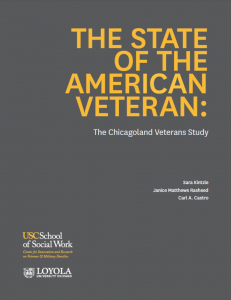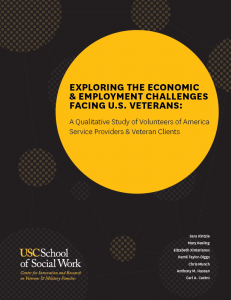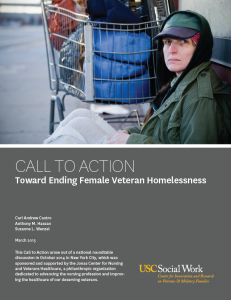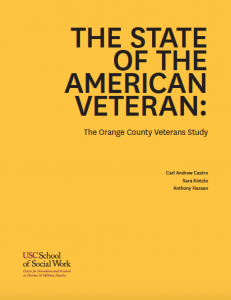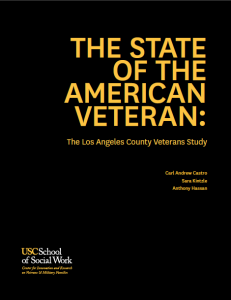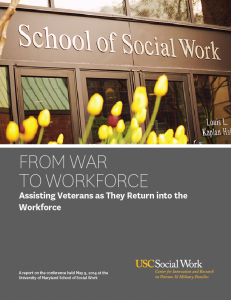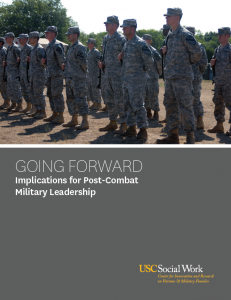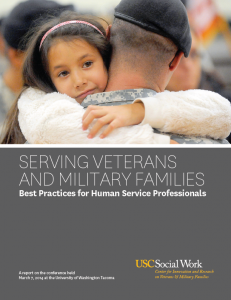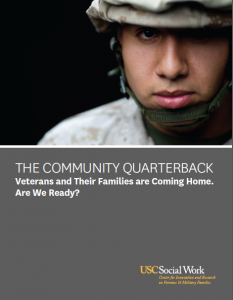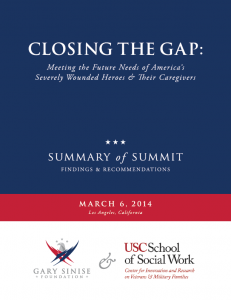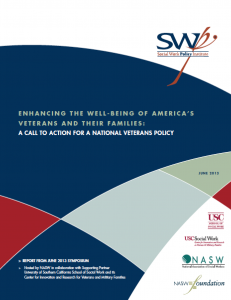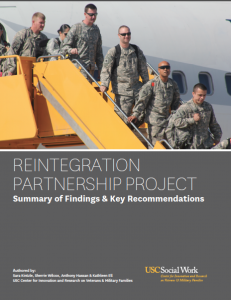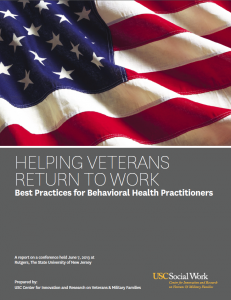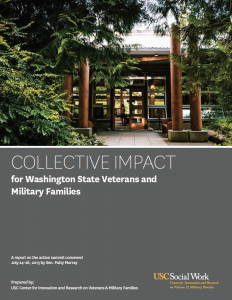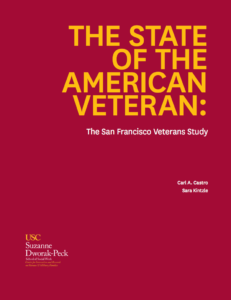 May 2017
May 2017
“The State of the American Veteran: The San Francisco Veterans Study” by the USC Suzanne Dworak-Peck School of Social Work Center for Innovation and Research on Veterans & Military Families (CIR) outlines the findings of a survey conducted 2016-17 of 722 veterans living in the San Francisco Bay Area. This comprehensive study of the military population represents the fourth overall—and third in the state of California. It explored numerous areas, such as transition challenges, employment and finances, housing, health and access to veteran services.
Emerging as a theme across various studies is that veterans throughout the state and the nation encounter significant transition issues. The San Francisco Veterans Study highlights that separating service members are not being engaged effectively or early enough in their transition process.
| Download full report |
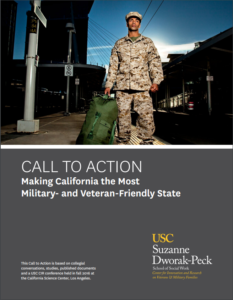
April 2017
This Call to Action is based on collegial conversations, studies, published documents and a USC CIR conference held in fall 2016 at the California Science Center, Los Angeles.
California has a unique opportunity to improve the state of the American veteran and, in so doing, move to the top of the list of America’s most veteran-friendly states.
To be “military-” and “veteran-friendly” means military families, in service and after, are both welcomed and valued in California communities, recognizing the need for tailored events, coordinated efforts, benefit programs, services and policy measures that ensure communities are culturally prepared to
support them as they transition to civilian life.
California is home to almost 2 million veterans and more than 57,000 service members currently serving in the National Guard and Reserve components. Although it has the largest veteran population in the nation and a long history of supporting men and women in service, California still falls in the middle of the pack across multiple military- and veteran-friendly state benchmarks (e.g., employment rate, income and affordability, tax laws, housing, mental health access, and access to the VA). Recent studies have shown that post-9/11 veterans experience greater difficulty transitioning to civilian life, reporting higher rates of health and mental health disabilities than previous generations of veterans (Castro, Kintzle & Hassan, 2015; Kemp & Bossarte, 2012). With more veterans, active duty and reservists than any other state, California bears the responsibility to lead this challenge.
After more than 15 years in war, the outpouring of support for veterans and their families is awe-inspiring. We seek to maximize our collective impact and ask some of the state’s most influential veteran leaders to come together and create a plan for solving the unmet challenges facing our veteran and military families today. Traditional models of support will not get us there. We must build a better California system for those who have served, are still serving and will return to this great state after service.
| Download full report |
“The State of the American Veteran: The Chicagoland Veterans Study” by the USC School of Social Work’s Center for Innovation and Research on Veterans & Military Families outlines the findings of a survey conducted in 2015-16 of more than 1,200 veterans living in Cook, DuPage, Lake and Will counties in Illinois. This comprehensive study of the military population, which also includes follow-up focus groups with 20 veterans, is an extension of similar studies conducted in Southern California. It explored numerous areas, such as transition challenges, employment and finances, housing, health and access to veterans services.
Key among the findings is that many service members leave the military without having lined up some key elements that could complicate their transition home. This study also looked into military identity, perception of veteran status and social connectedness.
| Download full report |
Commissioned by the Volunteers of America (VOA), Exploring the Economic & Employment Challenges Facing U.S. Veterans: A Qualitative Study of Volunteers of America Service Providers and Veteran Clients was part of an ongoing effort to better understand the needs of the nonprofit’s veteran clients and continuously improve veteran services. The purpose of this study was to explore the economic and employment challenges facing U.S. veterans today and identify best practices for helping impoverished veterans find and retain stable, living-wage jobs. Three approaches were used to examine these challenges and best practices, including a comprehensive literature review, one-0n-one interviews with VOA service providers, and focus groups with VOA veteran clients.
Certain themes arouse from the interviews with service providers and clients, among them:
- A lack of preparation for civilian employment during transition form the military creates unrealistic job expectations and difficulty understanding how military experience may or may not translate to civilian employment;
- Veteran clients with a less-than-honorable discharge and/or criminal background are at particular risk for chronic unemployment and have specific challenges related to finding civilian employment; and
- A lack of available jobs that are appropriate to veterans’ skills and experiences, but that also pay a living wage, is often an additional challenge to veteran employment.
The report also found unique strengths from the VOA approach that can be expanded to help veterans, including the use of peer-support networks.
Download executive summary Download full reportThis Call to Action arose out of a national round-table discussion in October 2014 in New York City, which was sponsored and supported by the Jonas Center for Nursing and Veterans Healthcare, a philanthropic organization dedicated to advancing the nursing profession and improving the healthcare of our deserving veterans.
The opportunity to end homelessness in our female veteran population is within our reach. Coordinated, collaborative, and visionary actions will be required. This effort will need to engage individuals, groups, and communities with a visionary new approach that focuses efforts and resources on preveiontion and early intervention versus the current model of reacting to homelessness once it actually occurs.
Download full report.“The State of the American Veteran: The Orange County Veterans Study” by the USC School of Social Work’s Center for Innovation and Research on Veterans & Military Families outlines the findings of a survey conducted in 2014 of more than 1,200 veterans living in Orange County. This comprehensive study of the military population, which also includes follow-up focus groups with 35 veterans, is an extension of a similar study conducted in Los Angeles. It explored numerous areas, such as transition challenges, employment and finances, housing, health and access to veterans services.
Key among the findings is that many service members leaving the military and returning to Orange County are not prepared for the transition home and have a range of needs that cannot be easily provided by a single organization. Further, mental health is a concern for this population, especially among the most recent generation of veterans who have high rates of suicidal thoughts.
Download full report.September 2014
“The State of the American Veteran: The Los Angeles County Veterans Study” by the USC School of Social Work’s Center for Innovation and Research on Veterans & Military Families outlines the findings of a survey conducted fall 2013 of more than 1,350 veterans living in Los Angeles County. The first comprehensive study of a large urban military population, which also includes follow-up focus groups with 72 veterans, explored numerous areas, such as transition challenges, employment and finances, housing, health and access to veterans services.
Key among the findings is that many service members leaving the military and returning to LA County are not prepared for the transition home and have a range of needs that cannot be easily provided by a single organization.
Download full report.Securing gainful employment has long been seen as a key goal to a successful transition from military to civilian life; however, despite numerous efforts, the jobless rate for post-9/11 veterans has remained stubbornly high.
Obstacles exist in educating civilian employers about the strengths and challenges facing veteran workers. Once hired, veterans would also benefit from employee assistance programs and social workers in human service agencies who can understand and mitigate some of these challenges.
Prudential and the Center for Innovation and Research on Veterans & Military Families have committed to presenting conferences at select universities’ schools of social work, aimed at bringing together front-line workers to discuss best practices that will help transitioning veterans gain and retain meaningful employment.
In May, a conference was held at the University of Maryland School of Social Work. This is a summary report of the event.
Download Full ReportAfter 13 years of wars in Afghanistan and Iraq, much of the current focus has been on the veteran’s transition home. Far too little, however, has been written or understood about soldiers’ daily living in a post-combat garrison—the time when they are not actively deployed to the front line, but have not yet transitioned home, either—including how combat soldiers relate to one another, their unit leadership and their community after coming home from war.
This critical time presents unique short- and long-term challenges and opportunities. Post-combat leadership has the potential to immediately mitigate some of the adverse effects of combat. Leaders’ values and behaviors—what they say and what they do—at the small unit level should reflect the larger shift in military culture that the senior leadership is trying to achieve by supporting mental health for their subordinates.
Download Full ReportMay 2014
Securing gainful employment has been seen as a key goal to a successful transition from military to civilian life; however, despite numerous efforts, the jobless rate for post-9/11 veterans has remained stubbornly high.
Obstacles exist in educating civilian employers about the strengths and challenges facing veteran workers. Once hired, veterans would also benefit from employee assistance programs and social workers in human service agencies who can understand and mitigate some of these challenges.
Prudential and the Center for Innovation and Research on Veterans & Military Families have committed to presenting conferences at five university schools of social work, aimed at bringing together front-line workers to discuss best practices that will help transitioning veterans gain and retain meaningful employment.
In March, a conference was held by the University of Washington Tacoma Social Work Program. The Puget Sound region is home to Joint Base Lewis-McChord, which every year sees about 9,000 troops exit.
Download Full ReportAre we ready? Is our community ready? Is our country ready to honor the moral obligation to ensure that its veterans and their families receive the services promised to them when they enlisted and to completely address any injury, illness or other disparity created as a result of their service?
We know that communities that successfully support their military-impacted populations are those that engage their entire citizenry in the unique challenges facing veterans transitioning home. Therefore, we need to create a coordinated community-based approach that brings together diverse sets of resources and identifies new opportunities across public and private sectors–a community quarterback.
There appears to be no end in sight to the ongoing stressors for military personnel and their families. The United States has been continuously at war for more than a decade with the conflicts in Iraq and Afghanistan the longest in our nation’s history. Persistent instabilities in the Middle East, North Africa and Asia are likely to keep American forces engaged in combat operations for many years to come. The demanding operational tempo of two challenging combat theaters coupled with the nature of the nation’s all-volunteer force, and the expanded involvement of military reservists has meant that many service members have been deployed multiple times since 2001, which in turn has brought family and community issues to the forefront and into the realm of veterans issues. It is apparent that psychological and personal stresses for service members and their families are more prevalent and widespread than previously understood.
Download Full ReportMay 2014
On March 6, 2014, USC Center for Innovation and Research on Veterans & Military Families hosted a full-day summit with the Gary Sinise Foundation.
Held at USC, about 60 attendees aimed to identify gaps in care and work toward solutions to better support the veterans who experienced such severe trauma as limb amputations, severe burns and traumatic brain injury.
This “Summary of the Summit” includes perspectives, findings and recommendations.
Download full PDFThe faces of America’s veterans are changing. The changes include – more women, decreasing average age, greater racial and ethnic diversity, growing number of veterans with young children, and veterans and their families dealing with the impact of multiple deployments and the impact of physical and mental wounds which may require lifelong attention. These changes require comprehensive responses from governments at all levels, as well as the engagement and participation of communities, and veterans, and their families at every stage. This will require new approaches to service delivery, coordination across sectors, across disciplines and across levels of government, and engagement of sectors that do not necessarily view themselves as veteran-focused or part of the veterans’ service array.
This report is a product from the symposium, Enhancing the Well-being of America’s Veterans and Their Families: A Call to Action for a National Veterans Policy, hosted by the NASW Foundation’s Social Work Policy Institute in collaboration with supporting partner, the University of Southern California School of Social Work, and the USC Center for Innovation and Research on Veterans & Military Families, on June 12-13, 2013 in Washington, D.C.
Download Full ReportDownload Action Brief
There are approximately 2.6 million men and women who have served in the U.S. military during the post-9/11 period and their transitions home after deployment often create a rollercoaster of mixed experiences. About 40 percent of the fighting and support services deployed to Iraq and Afghanistan are members of the National Guard and Reserve Forces who often return to civilian communities that are ill-prepared to accommodate their reintegration needs.
This brief describes the Reintegration Partnership Project, which explored the transition process for California National Guard members and their families after Reintegration Skills Training (RST), an evidence-based problem-solving practice aimed at easing the challenges associated with transition from combat to civilian life. It also reports findings of a follow-up assessment of the reintegration experience for California National Guard members.
Download PDFSeptember 2013
In an attempt to share cross-sector best practies to meet the needs of veterans in the workplace, nearly 300 behavioral health practitioners gathered for a daylong conference at Rutgers, The State University of New Jersey.
Helping Veterans Return to Work: Best Practices for Behavioral Health Practitioners focused on a comprehensive approach to veterans’ health, which included physical, emotional, social, spiritual, and financial components.
CIR director Anthony Hassan gave the keynote address at the conference, where he stressed that the most important thing for health practitioners and employers to understand is military culture to make “the connection” on the first encounter.
Download PDFSeptember 2013
In July, USC CIR’s expertise was sought during a Washington state summit aimed at building an effective collaborative to meet the needs of veterans and military families. The Military Families and Veteran Action Summit was held from July 24-26 at IslandWood, Bainbridge Island, WA and convened by Sen. Patty Murray (D-Wash.).
The summit brought together a diverse cross-sector of fields — health, research/education, employment, legal, military families, community models, and philanthropy.
CIR Director Anthony Hassan shared his knowledge of creating connections and partnerships among individuals and organizations for collective impact, drawing upon his experience with the Los Angeles Veterans Collaborative.
Download PDF

